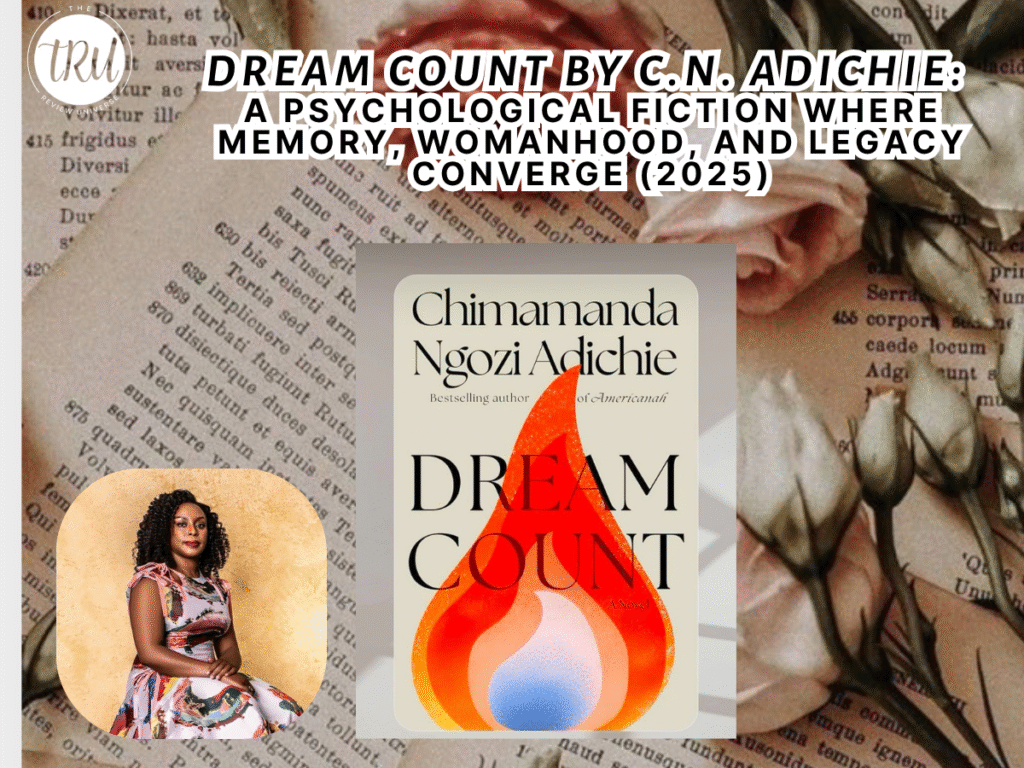
Dream Count by Chimamanda Ngozi Adichie is a haunting, lyrical, and fiercely human novel about identity, memory, and the quiet revolutions of womanhood.
| Author Name | C.N. Adichie |
| Book Name | Dream Count |
| Published Date | 4 March 2025 |
| Genre | Literary Fiction |
| Amazon | Dream Count by C.N. Adichie |
| Goodreads | Dream Count by C.N. Adichie |
| Format | Kindle/Audiobook/Hardcover/Paperback |
| Pages | 416 |
| Language | English |
Dream Count is not just a story, it is an invocation. A novel that asks us to sit with discomfort, to unpack memory, and to witness the ways in which women’s dreams are shaped, silenced, and sometimes, miraculously, set free. If you’ve loved Adichie’s Americanah or been moved by the aching emotional layers in Purple Hibiscus, Dream Count is the kind of novel that will stay with you, quietly echoing through your days.
It’s also an extraordinary literary return from one of the most influential voices in global fiction.
The Story
Set between 1990s Nigeria and present-day America, Dream Count follows four women, Anuli, Chisom, Fola, and Temi, who meet in university and remain tethered across decades, distance, and the unfinished sentences of their youth. At the center of the narrative is Anuli, whose notebooks, part journal, part manifesto, begin and end each chapter, creating a scaffolding of memory that stitches together both their lives and the very soul of the novel.
What begins as a shared dream between friends, to write, to lead, to break generational molds, begins to unravel with time, marriages, migrations, and the haunting realities of being women in a world that only partly sees them.
Each woman’s life unfolds with distinct arcs:
- Chisom, the quiet revolutionary, becomes a political journalist fighting censorship in Lagos, until tragedy forces her into silence.
- Fola, the most privileged among them, marries into wealth in the U.S., only to realize that comfort comes with its own price: erasure.
- Temi, an artist with synesthesia, battles mental illness, generational trauma, and the burden of creativity in a world that punishes emotional sensitivity.
- And Anuli, the thread through them all, is both witness and wanderer, wrestling with displacement, desire, and an unfinished manuscript titled Dream Count.
What binds these women is more than friendship. It is the shared burden of memory, and the hope that somewhere, their stories might still matter.
Read Similar: Famous Last Words – Gillian McAllister (A Psychological Thriller Exploring The Truth And Secrets)
Themes & Tone
At its core, Dream Count is a meditation on:
- Womanhood – how it’s defined, distorted, and reclaimed
- Memory – the act of remembering as resistance
- Diaspora – the duality of belonging and exile
- Silence – both imposed and chosen, and what it costs
Adichie’s writing is never rushed. Each page is weighted with meaning, yet never heavy. The tone balances the poetic with the political. There are moments of humor, surprising tenderness, and even quiet joy, especially in the women’s early days on campus, sharing cups of milky tea and dreams too big for their bodies.
But this isn’t a novel that shies away from pain. The emotional beats hit hard. And that’s the point, Dream Count asks readers to bear witness, not just to the story, but to the women inside it.
About the Author – C.N. Adichie
If Adichie’s earlier works solidified her as a literary force, Dream Count confirms her legacy.
Born in Enugu, Nigeria, and raised in Nsukka, Adichie’s work consistently blends the personal with the political, illuminating the inner lives of women navigating post-colonial identity, racism, and feminism. Her TED Talk, We Should All Be Feminists, has been translated into over 30 languages. Her debut novel, Purple Hibiscus, won the Commonwealth Writers’ Prize. Her second, Half of a Yellow Sun, remains one of the most definitive fictional accounts of the Biafran War.
But Dream Count feels more intimate. More rooted. Like Adichie reaching inward rather than outward, writing not for the West to understand Africa, but for African women to see themselves.
What Readers Are Saying
Reading Dream Count by Chimamanda Ngozi Adichie felt like walking through an emotional landscape I didn’t know I needed to explore. Every chapter pulsed with authenticity, raw, tender, and beautifully unfiltered. The story resonated deeply, especially as a woman of color; I saw parts of myself in the characters, their softness, their imperfections, their yearning to be seen without having to perform strength.
Adichie offers more than a narrative, she offers permission: to be emotional, to be complex, to be real. Her prose is poetic without being pretentious, carrying themes of grief, immigration, and identity with such grace that I often found myself pausing, not to process confusion, but to soak in the weight of her words. This book didn’t just move me; it mirrored me. It reminded me that literature isn’t just about escape, it’s about recognition.
Read If You Love:
- Complex female friendships
- Literary fiction with poetic prose
- Diaspora and cultural duality
- Emotional introspection and internal monologue
- Stories that stay with you long after the last page
Final Thoughts
Dream Count is a novel that breathes. It pulses with memory, ache, hope, and the courage to speak. It’s the kind of book that doesn’t just change your bookshelf, it changes your perspective.
If you’re looking for fast-paced plot twists or breezy romance, this may not be your pick. But if you’re ready to sit with a story that unfolds slowly and meaningfully, revealing itself like memory, then Dream Count is your next must-read.
This is Adichie at her quiet, brilliant best. And the dreams she counts here are not just her characters’. They are ours too.
